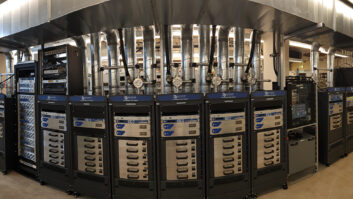When it comes to backup power generators, lack of maintenance means lack of reliability.
How many times have you heard about a power outage in which a generator failed to start? It is a common tale. Generators, often referred to as gensets, are a serious maintenance item.
Make power generator upkeep part of your maintenance routine.

Mark Persons. ‘Gensets are a serious maintenance item.’ Testing, 1,2,3
Most important: Test every genset online, monthly.
Test for 15 minutes. This gives the engine plenty of time to come up to full normal operating temperature. Anything less and you are setting yourself up for failure when the power goes out.
Your genset may have a timer to run on a weekly basis. Yes, you can exercise the engine that way; but I recommend against having it go online without an engineer present to pick up the pieces when things go wrong.
Battery considerations
You need to think ahead to avoid problems when replacing a battery. Explosions can and do happen when well-intentioned people do the wrong thing around batteries. All it takes is an accidental short from the positive battery terminal to ground to cause one.
Put the generator control into the off position, so there is no way for it to start during the work. Turn off the battery charger. Disconnect the negative battery terminal first.
This may go counter to your electronics thinking. Look at it this way: If you are working on the positive battery terminal while the negative is still connected to ground, an accidental short to ground could draw many thousands of amperes of current, resulting in a battery explosion. Ouch! With the new battery, connect the positive cable first, the negative last.
Mark the date on a new battery for easy reference.
Often the positive battery terminals become corroded first. I don’t know why, they just do.
This is not the time go in with a metal brush to do the cleaning. I use a plastic dustpan brush and a Shop-Vac with a plastic hose when cleaning around batteries.
After cleanup and when installing a new battery, use battery terminal protection of some sort. I use a red liquid that comes in an aerosol can, available at many battery stores. The goal is to keep ugly corrosion from growing on a battery terminal. That oxide often will increase resistance to the cable connected to the battery. It is a bad scene, just when you need 100 amperes of current to start the engine.
Coolant
Many gensets have sensors for water level in the radiator. If the level is too low, they will shut down, usually after running for just a few seconds.
Since most gensets have coolant heaters, it is normal for the coolant to boil off with time. My feeling is that genset manufacturers go overboard in keeping the engine hot on a 24/7 basis at your expense for the electricity.
A typical heater is 1,000 or 1,200 watts. I like to see two coolant heaters wired in series. They will draw half the power and still keep the genset engine warm. Caution: You may void a genset manufacturer warranty if you do this.
Critters
Mice are common in my part of the country. They can crawl through holes about the size of a human finger. Mice like to chew on wire insulation and can cost money, not to mention reliability. Best to keep them critters out.
I use and recommend 1/4-inch hardware cloth. It is like window screen but made of galvanized metal with openings just 1/4 inch across. The product is available from hardware stores and easy to install over openings to a genset.
Other stuff

A corroded battery terminal. Often the positive battery terminal corrodes first. Diesel engines have a fuel water separator. Best to bleed off water whenever you do maintenance.
If you find rust on an engine oil filter, you know the filter has been in service for more than a year or two. I recommend replacing the filter at least once every two years. Some mechanics do it annually.
Lubricate a new oil filter’s rubber seal with oil before installing it. This will keep it from leaking.
Dedicate a clipboard with a maintenance checklist to each genset you have. Shown on this page is a list that can be modified to fit your situation or site. A printable copy is on my website under Tech Tips/Miscellaneous.
I don’t sell Kohler backup power generators but I am a real believer in them. The proof comes when you have an uninterruptible power supply as a part of the generator load. My experience is that any UPS is happy with the power generated by a Kohler.
If you discover anything odd while doing your monthly maintenance, talk to someone who can give you answers. A genset service company is a good place to start. Remember, a genset is no good if it won’t do the job when it is needed.
See you further down the road. I’ll leave the soldering iron on for you.
Mark Persons WØMH is certified by the Society of Broadcast Engineers as a Professional Broadcast Engineer and has more than 30 years experience. His website iswww.mwpersons.com.
Backup Power Generator Maintenance Checklist For generator at: _____________________________________________________ site.
Engine Hours at start:___________________ At end of work:___________________
Monthly Maintenance
Check generator for mice and other environmental problems: ______________
Feel the engine block to see if water heater is working: __________ (if liquid cooled)
Look for any fluid leaks: _______________
Run for 15 minutes under load: _________________
Battery Voltage: __________Volts before starting, ___________Volts while running
Oil pressure: ___________________________ Lbs
Engine temperature: __________________ Degrees F
Fuel tank level: ________________________ %
Annual Maintenance
Check/replace carburetor air filter: _________________
Check/add engine coolant: ________________(if liquid cooled) Quarts: _________
Check/add water in battery: ________________
Run engine for 10 minutes then replace engine oil and filter: ______ Quarts _________
3-Year Maintenance
Replace battery
5-Year Maintenance
Run engine for 10 minutes, then:
Replace coolant: _______________(if liquid cooled) Quarts _____________
Signature: ___________________________________________ Date: _______________
Comments:












